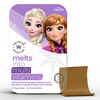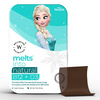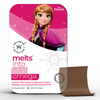“My kiddo just doesn't eat leafy veggies and fruits." If you find yourself saying this often or find mealtimes for your kids a struggle, chances are your kid may end up with nutritional deficiencies. Not just picky eating habits but having a low appetite, eating too many packaged items in the day, or some medical problem can also get in the way of your child receiving appropriate nutrition in their critical phase of growth and development. Thankfully, there are certain nutritional supplements that can help you bridge this nutritional gap for your kid. But with so many options available, how do you find the right supplements for your kids and ensure they are safe too? Let’s find this out through today’s article. But before we jump to the supplement section, let’s first understand the role of nutrition in kids and how these supplements can play a role.
Role of Nutrients in Kid’s Development
Nutrition plays a critical role in the development of every child. Proper nutrition can help build a strong foundation for their present and future health when provided at a formative age. Kids need a variety of nutrients, including vitamins, minerals, and macronutrients like carbohydrates, proteins, and fats, to support their physical and cognitive development. Various nutrients play a crucial role in the development of children. Proteins are essential for muscle and tissue growth, while carbohydrates provide energy for active lifestyles. Healthy fats support brain development and overall growth. Calcium and Vitamin D are vital for strong bones and teeth, while iron is necessary for producing red blood cells and preventing anaemia. Vitamin A is crucial for good vision, vitamin C boosts the immune system, and vitamins like vitamin B12 are important for their overall growth, cognitive development, and energy metabolism. Fiber promotes digestive health. Together, these nutrients ensure proper physical and cognitive development, making a well-balanced diet a fundamental part of a child's growth and well-being.
Kids at Risk of Nutritional Deficiencies
Certain kids can be at risk of developing nutritional deficiencies, which can hurt their development along with putting them at risk of developing frequent illnesses due to low immunity. Let’s look at some of the common causes of nutritional deficiencies in kids.
- Picky Eaters- Whether it's disliking particular food groups or filling up their tummies with minimal nutritional value foods like chips, candies, and pastries, Picky eating habits of kids are a sure-shot way for them to land up with nutritional deficiencies.
- Kids with gastric troubles—indigestion, constipation, frequent diarrhea, or stomach infections—can impact both dietary intake and absorption of nutrients from foods, leading to nutritional deficiencies.
- Limitations to food intake: Certain food allergies or cultural practices may prevent them from eating nutrient-rich foods, making them deficient.
How Supplements Can Help
A well-rounded diet that includes fruits, vegetables, whole grains, lean proteins, and dairy products should ideally provide all the necessary nutrients. However, these nutritional needs may not always be met due to various factors, from picky eating habits to digestive disorders. This may give rise to nutritional deficiencies, which may further lead to an array of health issues in kids. Nutraceutical companies have been successful in resolving this parental challenge with the introduction of supplements for kids. However, the variety and quantity of supplements available on the market can get you confused. We’ve listed a few strategies to help you shortlist and finalize the right supplements for your kids.
What to look for in supplements for kids
Whether you are looking for a multivitamin or a specific supplement like vitamin B12 for your child, here are some important points to consider.
- Dosage: Ensure the supplement's dosage aligns with your child's age, weight, and dietary needs. Avoid excess doses of vitamins and minerals, as excessive intake can be harmful.
- Ingredients: Go for products that use safe and high-quality ingredients clearly labeled on the package.
- Form: Consider the form of the supplement. For instance, multivitamin for kids typically include pills, capsules, chewable, or liquid drops. Choose the one your child can easily take based on age and preferences. These days, certain supplements also come in thin oral strips that tend to dissolve quickly on the tongue within seconds. Moreover, they come in delicious flavors that your kid may like.
- Allergens and Additives: Check the supplement's label for common allergens like gluten, dairy, and artificial additives. Opt for allergen-free and clean supplements, especially if your child has allergies or sensitivities.
- Toxin-free: Look out for products that mention that they are lead-free, heavy metal-free, and pesticide-free.
- Taste and Palatability: You may want to consider some tasty natural flavors without excess sugar supplements for your child. Let's not let supplement time be a replica of the tantrums thrown during mealtimes.
- Certification: Products that undergo third-party testing would be more reliable. Look for third-party certification from food and supplement safety organizations.
Summing Up!
Running around your kid with his meal plate in your hand? Or are you finding your kid falling sick often and unable to eat well? Knowing the importance of nutrition for a kid's development may further stress you out. You may improve this situation with the help of nutritional supplements. We’ve provided a few suggestions to help you select the best supplement for your kid. However, remember to get it approved by your child’s pediatrician before you make it available to your child.
References
https://raisingchildren.net.au/teens/healthy-lifestyle/nutrients/vitamins-minerals
https://health.clevelandclinic.org/multivitamin-for-kids/
https://kidshealth.org/en/kids/vitamin.html
https://www.nhs.uk/conditions/baby/weaning-and-feeding/vitamins-for-children/































